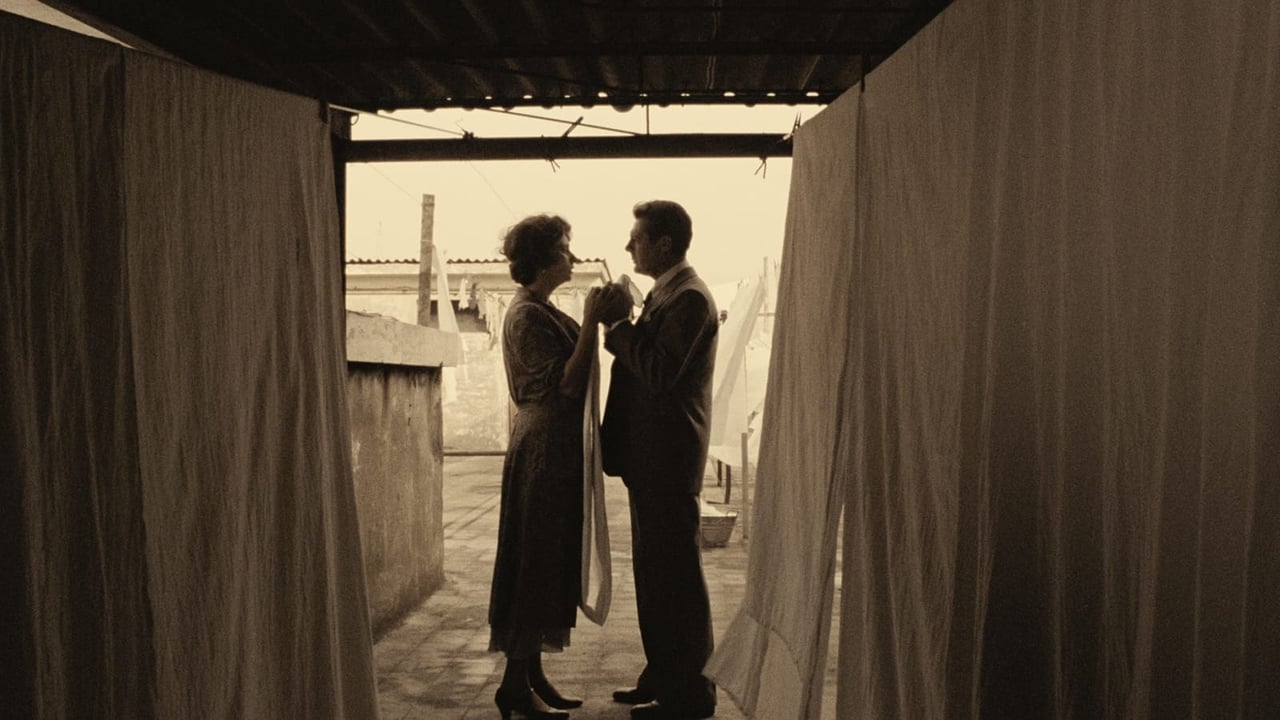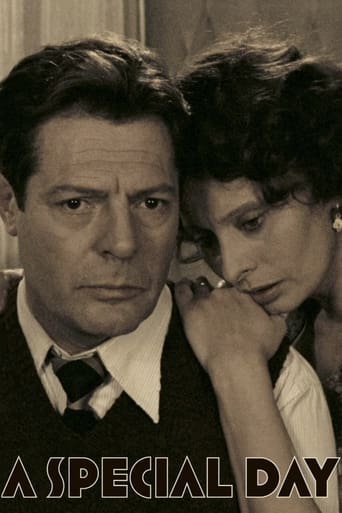

That was an excellent one.
... View MoreWhile it doesn't offer any answers, it both thrills and makes you think.
... View MoreOk... Let's be honest. It cannot be the best movie but is quite enjoyable. The movie has the potential to develop a great plot for future movies
... View MoreThe movie's not perfect, but it sticks the landing of its message. It was engaging - thrilling at times - and I personally thought it was a great time.
... View MoreAn Italian look back at a dark chapter in their history is honest in saying that at one point, the Fascists and Nazis had popular support. Set during a visit by German dictator Adolf Hitler, who arrives with much fanfare and jubilant crowds, A Special Day is told from the perspective of a seemingly overworked and unhappy housewife who stays home while the family goes out to see Mussolini and Hitler. She winds up at the apartment of a neighbour, who the concierge says is an anti-fascist, thus making him despicable.Despite dealing with a dark past, A Special Day has a sense of humour which does make the film a bit special. When the mom finds her teenage son has a nude photo and tells him the priest would say he'll go blind, the boy replies the priest himself is half-blind, implying the priest would be preaching from personal experience. Likewise, when the housewife tells the concierge her visitor is just there to fix a light, she goes back to the kitchen to find him unexpectedly fixing it, not requested. Still, the film is also serious, revealing the man is an outcast from the fascist establishment because he is homosexual. He is treated humanely by the film, which can be said to have a lot of soul.
... View More"A Special Day" is not a film for everyone. While it is very well made and the acting is terrific, it's style and subject matter make it a movie that the average person would probably not enjoy.This film is set in Rome during the first meeting between Mussolini and Hitler. The city is abuzz and fascists are excited to see the treaty between the two formidable nations. However, while this is a bit, global event, the film is very small--confined to a couple apartments nearby and involving two strangers who quickly become friends. While Antoinetta (Sophia Loren) stays home and keeps house while her husband and children attend a fascist rally, she is left alone--with little to actually do. When her pet bird escapes and flies towards another apartment, she gives chase and meets Gabriele (Marcello Mastroianni). The two hit it off--and the rest of the film consists of the two talking....and talking. Some of it is very interesting (such as when Antoinetta falls in love with Gabriele--only to learn he is gay) and much of it seems like small talk among friends. As for me, I liked it for the acting, but even with my high tolerance for this sort of film, it did get old after a while. Additionally, the film's lousy print (it appears to have either been copied from a degraded videotape or directly from TV) makes it a rather unrewarding viewing experience. Not bad--just not all enjoyable.
... View MoreThe film begins with approx five minutes archive footage from Hitler's Italian state visit May 8th 1938, a gigantic, enthusiastic reception by Mussolini, the King, the diplomatic corps, leading Italian industrialists (whose names are still familiar) and 90 percent of the city's population and a military parade. Hitler's address we hear is from the 1934 Nuremberg Party Meeting, speaking the third day to the German Youth, be "strong and peaceful", "courageous and peace-loving". Antonietta, alone in the roman hyper modern apartment block, the family can not afford a maid, overworked, barely literate housewife and enthusiastic mussolinisupporter. The myna bird Rosamunde escapes and flies to the other side of the courtyard of the apartment block; the reason that Antonietta and Gabriele meet. The well-mannered, cultured Gabriele has recently lost his job as a radio announcer. The concierge warns Antonietta, asking what she has against him, "I say this for your own good. Certain people are bad for your name. I didn't want to say it... but that one from the sixth is a wart, a traitor... an antifascist. In short, a bastard." Gabriele tells Antonietta that he does not fit "L'ordine è la virtù dei mediocre". While Antonietta prepares the coffee, Gabriele looks at her treasured fascist album: the fascist women are the homes guardian, a man is not a man if he is not a husband, a father and a soldier and that genius is not a female but a male feature. They argument, speak, he laughs and asks "So why aren't you laughing? You should have everything you want? A home, a husband, six children. Why aren't you laughing?" On the flat roof, collecting the laundry, truth is revealed, Gabriele not a man, can not be a father and will never be a soldier. He is gay. She, at first pretending not to understand and when she hits him, taking the run and Gabriele after her, accusing that she needed him, she accusing for the same shortly before he told her the truth. Gabriele, furious what society doe with him, she receiving screen: " good for what you want and ready for judging us and lynch others". The ecstatic, forlorn love scene in his apartment. Is her self-important, macho husband the reason, the wife needed for child-production. And the intelligent, sensitive, sardonic gay Gabriel, cashiered from work because of being degenerate, waiting for his escort for Sardinia, Carbonia (where gays were rounded up by the Fascist regime and the more fit of them forced to work in the local coal mines, on the wrong assumption that having them engage in "manly" work will somehow "fix" their issues); another movie is Cristo Si e' Fermento a Eboli, the doctor from Turin, Carlo Levi). Antoniettas body, rejected by her husband and this man, after the initial chock, rapes this anti fascist, gay body. Is the gay really willing to give the fascist what she asks for? The scene can be translated differently: When does rape start and what gives the permission? A gesture, a look, what? The fact here is her power and he as the 'vogelfrei' object, using him without a witness. He tells how he pretended normality. A friend at work as his fiancé, both a normal couple, going to the movie, eating at restaurants. But it didn't work. After the act the fascist admits that she never had such an experience before, he answering that in his situation sex with a woman is possible " but changes nothing. To meet you, be a day with you has meant much for me, just today." And she: "It is enough to see you, hear you, seeing your window." The encounter turns them not into a straight and an anti-Fascist, but their future life has a different angle to look at. The movie has in focus a gay, representing the other none-mediocre, the disabled, gypsy, colored, Jews. Used as taxpaying 'Freiwild', needed for mediocre taxpaying staff . The background sound, the fascist rally at Via dei Fori Imperiali, 'Guido Notari' replacing Gabriele. Antonietta, honest, shocked, hitting him, returned in shame. She recognized him, as the others, but saw him behind recognition, liking what she saw. The same for Gabriele, sharing with her a meal of an 'omelette'. By looking again (anamorphosis is a distorted projection or perspective requiring the viewer to use special devices or occupy a specific vantage point to reconstitute the image; anamorphosis, formed again) both form again his gay and her child producing distortion function. They see beyond themselves what they are beyond. The skewed skull in Holbein's painting The Ambassador is anamorphic distortion, meant as visual puzzle for the viewer approaching the painting from the side, to see the form morph to a human skull. Was the painting meant to hang in a stairwell, so that a person walking up the stairs from the painting's left would perceive the skull? Should we, "walking up the stairs from the gay's left" perceive beyond the distortion what is behind? As the movies title: not only a special day for the fascist but for the gay and the child producing machine: Una Giornata Particolare.
... View MoreFirst of all for this movie I just have one word: 'wow'. This is probably, one of the best movies that touched me, from it's story to it's performances, so wonderfully played by Sophia Loren and Marcello Mastroianni. I was very impressed with this last one, because he really brought depth to the character, as it was a very hard role. Still, the two of them formed a pair, that surprised me, from the beginning until the end, showing in the way, a friendship filled with love, that develops during the entire day, settled in the movie. The story takes some time to roll, as the introduction of the characters is long, but finally we are compensated with a wonderful tale about love and humanity. If you have the chance, see it, because it's a movie that will stay in your mind for many time. Simply amazing - 9/10.
... View More